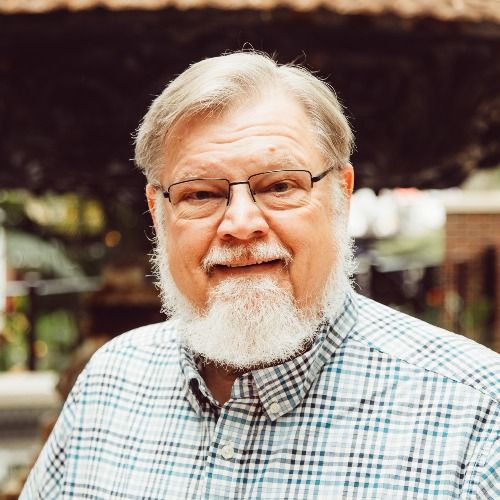Episode 936
Faith and Classism: A Call for Inclusion in Sacred Spaces
The "Daily Bible Refresh" is presented each day by Rev. Dr. Brad Miller who has a goal of speaking a bit of the bible into two million ears (one million people) in three years (2025-2028).
He is the author of "The A, B, C-1,2,3 Bible Study Guide" Free to you by clicking HERE.
Brad served as a local church pastor for forty years and has a background in radio and podcasting. Moreover, he is a life-long student of The Bible.
He believes in the words of Jesus that “scripture is fulfilled in your hearing” (Luke 4:21)
The "Daily Bible Refresh" is available seven days a week by 6:00 am ET. The episodes are no longer than ten minutes long and are...
- Understandable: A reading from the New Testament (usually the Gospel) selected from the Revised Common Lectionary using "The Message" translation.
- Relatable: You will have a couple of "points to ponder" from the text which will relate to your life
- Applicable: Every episode includes a way you can take action based on the reading
- A recommended resource to help you go deeper in biblical study and spiritual direction.
- A prayer for your day.
A companion resource to the Voice of God Daily Podcast is the “ABC Bible Study Guide” available by clicking HERE.
The "Daily Bible Refresh" is available every day at VoiceofGodDaily.com on Apple Podcasts, Spotify and all major podcast directories.
You can help Dr. Brad attain his goal of getting a bit of the bible into two million ears by subscribing to "Daily Bible Refresh" on Apple Podcasts, leaving a five-star rating, and writing a review. More importantly please share with your network of family and friends about the "Daily Bible Refresh".
Please make listening to the "Daily Bible Refresh" a part of your daily life.
Remember… “All scripture is God-breathed and useful”(2 Timothy 3:16)
Addressing the pervasive issue of class prejudice in faith communities, this episode delves into the implications of James 2:1-7 and its challenge to societal norms of favoritism towards the wealthy. Dr. Brad Miller presents a compelling argument that such biases not only undermine the core tenets of Christianity but also distort the communal fabric intended by God. The passage from James serves as a stark reminder that divine preference lies with the marginalized, thus positioning the economically disadvantaged as integral members of the kingdom of God. This perspective compels believers to confront their biases and reconsider how they embody the principles of faith in their congregational practices.
Throughout the discourse, Dr. Miller explores significant themes such as internalized classism and divine economic reversal. He articulates how congregational dynamics often reflect broader societal hierarchies, where individuals are assessed and valued based on their socioeconomic status. This examination of classism within sacred spaces invites listeners to recognize their complicity in perpetuating these norms and encourages a critical dialogue about inclusivity within the church. Moreover, he highlights the insights that the economically marginalized can provide to the faith community, emphasizing the need to challenge prevailing narratives that equate financial success with spiritual favor.
To effect meaningful change, Dr. Miller proposes practical steps, including conducting a 'class audit' within faith communities. This involves assessing leadership representation, financial barriers to participation, and cultural dynamics that may alienate those with limited resources. By bringing these findings to the forefront, he advocates for proactive measures that foster an economically inclusive environment. The episode stands as an urgent call to action for believers to transform their communities into places of genuine welcome and equity, reflecting the radical love that Christ exemplified.
Takeaways:
- In this episode, we explore the profound implications of class prejudice within faith communities, particularly through the lens of James 2:1-7.
- We examine how internalized classism manifests in religious spaces, often leading to unequal treatment based on social status.
- The discussion highlights the kingdom of God’s preferential option for the marginalized and economically oppressed individuals.
- Listeners are encouraged to conduct a class audit within their own faith communities to identify barriers to inclusion.
- We reflect on the irony of favoring the wealthy, who frequently exploit the marginalized, challenging our systemic alignments.
- The episode concludes with a call to action, urging participants to advocate for economic justice in their communities.
Links referenced in this episode:
Companies mentioned in this episode:
- voiceofgoddaily.com
Transcript
Sacred Challenging Class Prejudice in Faith Communities A Study Based on James 2:1 7 here on the Daily Bible refresh with Dr. Brad Miller.
Speaker A:Hello good people.
Speaker A:Dr. Brad Miller here with the Daily Bible Refresh.
Speaker A:Our daily walk into the New Testament reading from the Revised Common Lectionary.
Speaker A:From a progressive perspective, we make the reading of the Bible understandable in as much as we read from the message version relatable.
Speaker A:We give you some points to ponder and applicable and we give you an action step to follow.
Speaker A:We have a prayer.
Speaker A:We do all of that in under 10 minutes or so.
Speaker A:Everything here is brought to you by the voiceofgoddaily.com that is where you're gonna find our free resource the ABC 123 Bible Study Method.
Speaker A:Please join us in our efforts to get the audible word of God into two millionaires a million people by 20.
Speaker A:Here's our reading for the day from James 2:1:7 from the Message the Royal Rule of Love My dear friends, don't let public opinion influence how you live out your live out our glorious Christ originated faith.
Speaker A:If a man enters your church wearing an expensive suit and a street person wearing rags comes in right after him and you say to the man in the suit, sir, sit here.
Speaker A:This is the best seat in the house.
Speaker A:And either ignore the straight person or say better sit here in the back row.
Speaker A:Haven't you segregated God's children and proved that you are judges who can't be trusted?
Speaker A:So listen my dear friends, isn't it clear by now that God operates quite differently?
Speaker A:He chooses the worlds down and out as the kingdom's first citizens with full rights and privileges.
Speaker A:This kingdom is promised to anyone who loves God.
Speaker A:And here you are abusing these same citizens.
Speaker A:Isn't it the high and mighty who exploit you use the courts to rob you blind?
Speaker A:Aren't they the ones who scorn the new name Christian used in your baptisms?
Speaker A:Well my friends, today we're exploring a really powerful passage from the book of James that confronts classism, classism in religious spaces and challenges to examine our own biases.
Speaker A:So let's talk about setting the scene here.
Speaker A:Here James addresses a situation that it seems remarkably familiar to me, preferential treatment of wealthy people, even in faith communities.
Speaker A:His words cut through superficial hospitality to expose a deeper systematic issue of class discrimination.
Speaker A:Here are some points to ponder.
Speaker A:The first is about internalized classism.
Speaker A:James exposes how we often unconsciously reproduce societal hierarchies in our sacred spaces.
Speaker A:So the detailed description of different treatment based on clothing and appearance mirrors our own tendencies to value certain types of people over others.
Speaker A:So how does our faith communities subtly communicate who is worthy of full inclusion and leadership?
Speaker A:The second point is about divine economic reversal.
Speaker A:The text claims God chose the world's down and out as the kingdom's first citizens.
Speaker A:This isn't about romanticizing poverty, but about recognizing how economic oppression shapes spiritual insight.
Speaker A:What might economically marginalized people teach us about faith, resistance and community?
Speaker A:How does this challenge prosperity gospel narratives?
Speaker A:Another point is about systematic analysis.
Speaker A:James points out the irony of favoring the wealthy, who often are the very ones exploiting the community through legal systems.
Speaker A:This invites us to examine how we sometimes align with systems that harm us and others.
Speaker A:How do our churches and organizations sometimes perpetuate the very injustices we claim to oppose?
Speaker A:Here's your action step.
Speaker A:Conduct a what we might call a class audit of your faith community or yourself or organizations that you're part of.
Speaker A:Observe who holds the leadership positions.
Speaker A:Examine the financial requirements to participate perhaps, and notice whose cultural norms dominate and identify barriers to participation for people with limited resources.
Speaker A:Then maybe bring your findings to the leadership and advocate for some changes to make the community more economically inclusive.
Speaker A:We're going to have a closing prayer here in just a minute.
Speaker A:I always want to let you know that we do have a opportunity for you to get deeper into your own personal Bible study and that's with the resource that we have for you.
Speaker A:Free resource called the ABC 123 Bible Study Method.
Speaker A:You just head over to our website voiceofgoddaily.com and there's a number of places there where you can click on a link and get that resource right in your inbox.
Speaker A:Let's pray.
Speaker A:Oh God, you are a divine disruptor.
Speaker A:When we create hierarchies and sacred spaces, remind us of your preference for four the marginalized.
Speaker A:When we judge by appearance or status.
Speaker A:Help us see with your eyes of love.
Speaker A:When we align with systems of oppression.
Speaker A:Give us courage to choose another way.
Speaker A:Make us uncomfortable with comfortable faith, bold and challenging class barriers and genuine in our welcome of all.
Speaker A:Transform our communities into spaces where economic justice is not just preached but practiced.
Speaker A:Wow, great stuff here.
Speaker A:Always great to be with you here on the Daily Bible Refresh.
Speaker A:It's our gift to you.
Speaker A:We did want you to know that the Daily Bible Refresh is completely listener supported.
Speaker A:If you'd like to support us, we just want to invite you to go to our website voiceofgoddaily.com scroll to the bottom.
Speaker A:There's a place there where you can leave your gift.
Speaker A:Any gift is helpful to get our message.
Speaker A: a million people by the year: Speaker A:You can help by help us this way, but also by subscribing to the podcast and inviting others to join us as well.
Speaker A:We're back here tomorrow morning.
Speaker A:We drop our episodes by 6am My name is Dr. Brad Miller.
Speaker A:We'll see you tomorrow.
Speaker A:Until then, remember that God's loyal love doesn't run out.
Speaker A:His merciful love hasn't dried up, is created new every morning.



